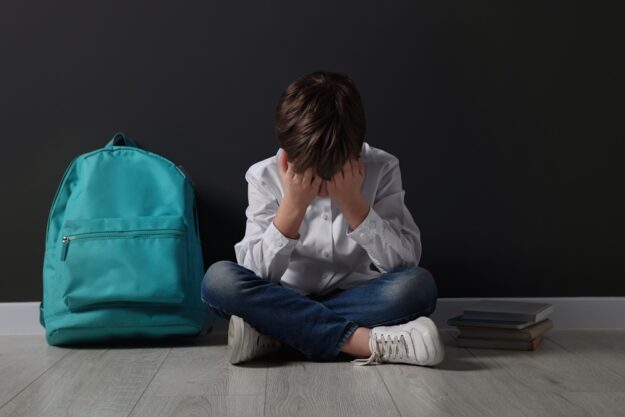Bullying is never okay, and it’s always important to speak up if you’re being treated unfairly at school. We’ve put together a guide to help you put a stop to bullying with the help of the people who care most about you.

Bullying in the UK: you’re not alone
Bullying makes people feel very lonely. When you experience bulling it can feel like you’re isolated from everyone else at your school. The truth is, bullying is very common. In one recent study, 1 in 4 UK kids said that they’d experienced bullying during their past week at school.
Bullying doesn’t just take place in schools— it can happen outside of school or even online. Bullying can affect people of all ages, and can happen at college, university or between adults in the workplace.
There are many different types of bullying. Bullying can be:
- Physical, such as pushing, spitting or hitting
- Verbal, such as name-calling or spreading rumours
- Emotional, such as leaving someone out or making them feel unwelcome
Why do people bully?
People bully for selfish reasons. They might do it to get attention, to show off, because they enjoy the adrenaline rush or because they feel jealous or insecure. Healthy, happy people do not bully others. Bullying is cowardly, and there’s no excuse for it.
It can be hard to be asked to try to feel sorry for someone who is being cruel to you, but you might be surprised to learn that bullies are often struggling themselves. One study found that in the UK, children who bully others are the most likely to report poor wellbeing in their own lives— even more so than their victims.
Many people bully because hurting others makes them feel like they have power and control. However, having a hard time in their own lives doesn’t excuse their nasty behaviour.
The impact of bullying on victims
Being a victim of bullying can damage your sense of self-worth, wellbeing, and can contribute to conditions such as depression and anxiety. You might find that your eating and sleeping habits change, that you feel angry at your friends or foster family or that you feel the need to withdraw from others and be alone. Bullying can also have a negative impact on your grades and your future if bullying makes you want to miss school or makes it harder for you concentrate in class.

How to deal with bullying at school
Remember, bullying is never your fault, and it is never okay. Let’s look at 5 tips to help put a stop to the bullying you may be facing once and for all.
-
Share your story.
The most important thing you can do to put an end to bullying is to tell the adults around you what is happening. You may feel a need to hide what’s been happening due to embarrassment or worrying that things might get worse if adults get involved. However, telling a trusted adult is the first step to putting an end to bullying.
You could tell your foster parents, a teacher, a social worker or your school counsellor. They will then involve other adults and take steps to prevent the bullying from happening in the future. Speaking with your school counsellor can also help you to find solutions and sort through your emotions.
If you’re not yet ready to tell an adult, there are organisations such as Childline who you can reach out to for advice and a friendly chat.
-
Keep a record.
Keep a record of incidents of bullying when they happen. You could do this by writing down what’s happened to you in a journal or in the notes app on your phone. You should write down what happened, who was involved, and who saw it happen in as much detail as you can remember.
Share this record with an adult you trust and keep adding to it if something else bad happens. Having this information available can be really useful in helping to resolve bullying issues. You may also choose to keep a personal diary to write down how being bullied makes you feel, which is a fantastic way of processing tough emotions.
-
Build your confidence and your resilience.
The sad truth is, bullying doesn’t always stop straight away once you tell an adult. Sometimes it can take time for things to be resolved and for school to start feeling like a safe place again. Because of this, it’s important to focus on what you can do to make yourself feel safe and secure while things get back on track.
One great way of doing this is building up your confidence and resilience. Confidence is your belief in yourself, and resilience is your ability to deal with difficult situations. Bullying can really knock your self-esteem, but by working on your confidence and resilience, you can become stronger than before.
Here are some tips on how to build confidence and resilience as a young person:
-
Remind yourself of who you are and what makes you special.
Sit down with a pen and paper and write down all the positive things about yourself. What are your strengths, values and talents? Celebrate your amazing qualities and what makes you unique. Re-visit your list whenever you need a confidence boost.
-
Treat yourself fairly.
Sometimes when we are being bullied, we can start believing the nasty things that people say about us. If you catch yourself thinking something negative about yourself, counter it with something positive.
For example, you might have a negative thought such as, ‘I’m no good at making friends!’ You could counter this thought by listing the qualities which make you a great friend, such as, ‘I’m really generous and I’m a good listener.’
-
Use positive affirmations.
You can also use positive statements about yourself throughout the day to help improve your confidence. These are called positive affirmations, and you can repeat them at any time of the day, such as while brushing your teeth or walking to school. An example of a positive affirmation would be, ‘I am confident and resilient,’ or, ‘I always stay true to who I am.’
-
You can create your own positive affirmations or find them online.
Reciting positive phrases out loud or in your head may seem silly at first, but over time they will help you to feel more confident.
-
Make time for your hobbies
— or try out a new one! Hobbies are a fantastic way of relieving stress, learning new skills and discovering more about yourself. Setting yourself a challenge, like learning how to play an instrument or creating your own comic book, can give you goals to work towards and something positive to focus your attention on during difficult times.
-
-
Develop strong friendships.
If you have a good friend or a group of friends in your life, talk openly with them about what you’re experiencing and lean on their emotional support while you’re going through this hard time. Having good friends can make all the difference when you’re facing bullying and can help you to feel less alone.
If you’re being bullied, you may feel like no one at school wants to be your friend. Some classmates may avoid you to avoid becoming a target themselves. Making friends doesn’t always come easy, but it’s really worth pushing yourself out of your comfort zone to build new friendships.
One great way of making new friends is by joining a new sports group or afterschool club where you can meet people who have similar interests. Keep an eye out for any kids who eat lunch alone or seem to struggle to find a friend group— you’d probably make their day by striking up a conversation, and you may well make an amazing friend.
Like with starting a new hobby, developing social skills takes time. Just as you wouldn’t expect to pick up a paintbrush for the first time and suddenly be a professional artist, you have to be persistent and not lose faith in yourself if things don’t go perfectly the first time. Sometimes you’ll say the wrong thing, or might do something that makes you cringe a little— that’s all part of the learning process!
-
Stand firm and speak up.
Many people bully because they find the other person’s reaction entertaining, whether that’s them getting upset or angry. Because of this, one of the best strategies for dealing with bullying is to stay calm. Though this can seem an impossible task, try not to have an emotional response in the moment. Instead, try to leave the area and tell an adult about what has happened.
As you work on building your confidence and resilience, you may find the strength to confront your bully directly when something happens. You can act with words, not fists, by turning the spotlight onto the bully by calling out their behaviour in a firm voice. Even though it can be difficult, being brave enough to speak up for yourself is one of the most powerful things you can do. Use assertive statements like:
- ‘I won’t answer to [nickname]. If you want to talk to me, you have to use my real name.’
- ‘Stop, I don’t like that. I am going to walk away if you carry on doing that.’
- ‘It’s really weird that you would say something so spiteful to another person who you hardly know.’
Sometimes it feels easier to stand up to another person than to stand up to ourselves. If you see someone else being bullied, it’s important that you speak up. Whether that means confronting the bully directly by calling them out, telling a teacher or being a witness for the person who is being bullied, you can make a big difference to how others are treated. Learn more about how to help someone who is being bullied.
Remember, you’re not alone
If you’re being bullied, don’t face it alone. Though you may feel afraid, speaking up is the best way to put a stop to bullying for good. Talk to your foster parent, a teacher, or your social worker— they will be so proud of you for speaking up and will do everything they can to help you.
Ready to learn more about navigating home and school life while living with a foster family? Keep an eye on our young person’s hub for more great information for young people in foster care.

